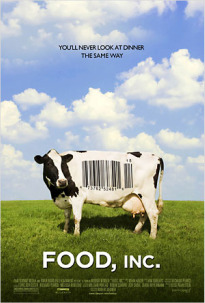By Heather Christie
After watching Food, Inc., I was mad at myself for being hungry. I had no right to be hungry, really. The images that the film projects of the food industry’s coercive, shady, and inhumane practices puts the Mafia, the tobacco industry, and Columbian drug lords to shame, collectively.
But I was hungry nonetheless.
What was I supposed to do? Eat meat? Nope. The idea of pens upon pens of tightly-packed cows, chickens, and pigs without access to sunlight or proper nutrition, doused in hormones and antibiotics, and standing up to their ankles in their own shit was not a particularly appetizing one.
How about a nice glass of soymilk or a tofu stir-fry? Or, for that matter, almost anything with a soy filler? (Which translates—by the way–into most products on the market) Well, if we’re to take the film at its word, apparently 90% of all soybeans contain a modified gene that is patented by one company, Monsanto. Now, that doesn’t really bother me on its own, but what does bother me is that any farmer who is not licensed to grow this GMO’d soybean gets the proverbial shite kicked out of them by Monsanto, the owner of the gene as intellectual property, even if it’s an accident. Seed dispersal happens naturally; it’s how all species ensure their survival (my very good friend who happens to be a total manwhore routinely justifies his actions as an evolutionary necessity). But the bosses up at Big Soy don’t care, and deal rather brutally with unlicensed farmers who are caught with GMO’d soy in their fields.
Ok, so what’s a hungry girl supposed to do when there’s nothing ethical to EFFING EAT?!? The answer arrived from the mouth of Stephen Pennell , traditional farmer extraordinaire. Pennell does farming the old school way. He raises his cows, pigs, and chickens organically, totally free-range, and hormone-free. The big meat companies tried to shut him down, but Pennell stood his ground and has yet to be defeated. Probably because he’s totally gorgeous, even at 50-something.
Anyway, the moral of the story is eat locally, eat organic, support independent farmers and grow what you can. The more peeps who jump on the wagon, the better it is for everyone; Big Food will have to change their dealings to become a more sustainable—in all senses of the word—enterprise.
The film itself is a little long. But maybe that’s the point. By the end of it, you’re likely to feel so guilty for supporting industrial food that you’ll want to go out and buy a pack o’ tomato seeds, a few barnyard animals, and turn your home into a farming commune. If that’s what it takes to change up the abysmal status quo, though, so be it.
As for my snack, I settled on a few–ahem–chocolate bars. Chocolate production practices aren’t mentioned in the flick, and what I don’t know can’t hurt me.




 Follow Us On Instagram
Follow Us On Instagram
